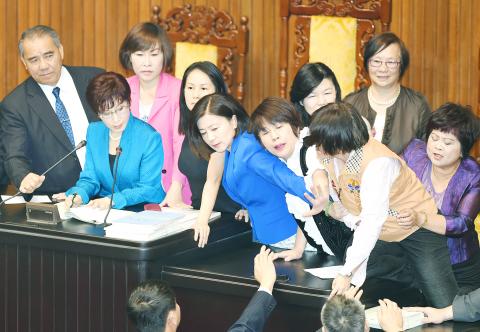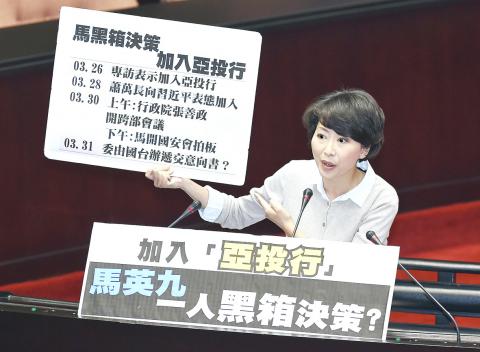Taiwan would rather not take part in China’s proposed Asian Infrastructure Investment Bank (AIIB) if it is not treated with dignity and equality, Premier Mao Chi-kuo (毛治國) said yesterday.
Mao made the remarks during a question-and-answer session on the floor of the Legislative Yuan in Taipei as he was peppered with questions about possible arrangements for the nation’s participation in the nascent development bank.
Yesterday was the deadline set by China to apply to become a founding member of the Beijing-based bank.

Photo: Liao Chen-huei, Taipei Times
The government submitted the nation’s letter of intent through the cross-strait communication channel between the Mainland Affairs Council and the Taiwan Affairs Office (TAO) of China’s State Council in Beijing.
Mao told lawmakers that the letter was addressed to the AIIB by Minister of Finance Chang Sheng-ford (張盛和), and the Mainland Affairs Council simply acted as the “messenger.”
Several Democratic Progressive Party (DPP) and Taiwan Solidarity Union (TSU) lawmakers criticized what they said was a hasty decision by the government to apply to join the AIIB and to make the application through the Taiwan Affairs Office.

Photo: Liao Chen-huei, Taipei Times
The decision to apply was announced after President Ma Ying-jeou (馬英九) held a national security meeting on Monday, one week after he asked former vice president Vincent Siew (蕭萬長) to convey Taiwan’s intent to join when he met Chinese President Xi Jinping (習近平) at the Boao forum on Saturday.
Ma revealed his instructions to Siew in an interview on Friday last week. Prior to that, Mao and other government officials had repeatedly said that the government would assess the possibility of joining the AIIB if it received an invitation from China.
However, China yesterday signaled that Taiwan might not be allowed to join the new bank.
“As for Taiwan joining [the AIIB], we maintain that we should avoid the ‘two Chinas’ and ‘one China, one Taiwan’ situation,” Chinese Ministry of Foreign Affairs spokeswoman Hua Chunying (華春瑩) told a regular briefing in Beijing, without commenting further.
Meanwhile, several scuffles broke out on the legislative floor as between 20 and 30 Chinese Nationalist Party (KMT) lawmakers pulled two TSU lawmakers away from the legislative podium as they tried to boycott the plenary meeting to protest against the government’s handling of the AIIB matter and China’s new M503 flight route.
The two TSU lawmakers spent several hours shouting that Ma had sold out the nation’s interests as the proceedings began, while two DPP lawmakers occupied the seat to prevent Mao from taking the podium, forcing Mainland Affairs Council Minister Andrew Hsia (夏立言) to take part in a cross-party negotiation that ended up lasting several hours.
DPP Legislator Chen Chi-mai (陳其邁) told a press conference that submitting an application to join the proposed bank through the TAO was like Hong Kong handing in its application to the Liaison Office of the Central People’s Government in Hong Kong.
Taiwan’s participation in the AIIB was “international” in nature, but Ma treated it as a “cross-strait” issue under the “one China” framework, Chen said.
A consensus was finally reached among lawmakers and Hsia on how to deliver the AIIB application: “The Executive Yuan should apply to join the AIIB on condition that the nation’s dignity is ensured, with the letter of intent to be delivered to the preparatory office of the AIIB to ensure the nation’s best interests are safeguarded and is not denigrated. Government agencies should conduct comprehensive assessments and present a report, including arrangements for the nation’s participation, to the legislature’s Financial Committee to allow for legislative oversight.”
Once Mao was finally able to take lawmakers’ questions, he defended the decision to go through the TAO.
“We have no other channel [with China] except the formal channel between the Mainland Affairs Council and Taiwan Affairs Office. This is the only one we have,” Mao said after DPP Legislator Pasuya Yao (姚文智) asked him why the then-Sports Affairs Council had been able to directly communicate with China about the 2008 Beijing Olympics.
Much of the criticism from DPP and the TSU lawmakers focused on how the government arrived at the decision to apply to join the bank.
TSU Legislator Yeh Chin-ling (葉津鈴) told Mao the TSU did not oppose Taiwan being part of the AIIB if the principles of equality and dignity are upheld.
In a post on Facebook, DPP Chairperson Tsai Ing-wen (蔡英文) said Taiwan would not stay outside of regional organizations, but the nation’s interests cannot be ensured without a thorough and unbiased assessment, democratic discussion, legislative supervision, and transparent and cautious decisionmaking.
Minister of Foreign Affairs David Lin (林永樂) said issues related to the AIIB would be dealt with through negotiations, citing the models in which Taiwan was admitted to the WTO and APEC.
Asked for comment, American Institute in Taiwan spokesperson Mark Zimmer said that the US respects the right of each economy to make its own decisions.
“We do believe that any economy participating in the AIIB should insist upon the same core standards that the international community has established in the existing multilateral development banks, especially governance and environmental and social safeguards,” Zimmer said.
Additional reporting by AFP

CHAOS: Iranians took to the streets playing celebratory music after reports of Khamenei’s death on Saturday, while mourners also gathered in Tehran yesterday Iranian Supreme Leader Ayatollah Ali Khamenei was killed in a major attack on Iran launched by Israel and the US, throwing the future of the Islamic republic into doubt and raising the risk of regional instability. Iranian state television and the state-run IRNA news agency announced the 86-year-old’s death early yesterday. US President Donald Trump said it gave Iranians their “greatest chance” to “take back” their country. The announcements came after a joint US and Israeli aerial bombardment that targeted Iranian military and governmental sites. Trump said the “heavy and pinpoint bombing” would continue through the week or as long

TRUST: The KMT said it respected the US’ timing and considerations, and hoped it would continue to honor its commitments to helping Taiwan bolster its defenses and deterrence US President Donald Trump is delaying a multibillion-dollar arms sale to Taiwan to ensure his visit to Beijing is successful, a New York Times report said. The weapons sales package has stalled in the US Department of State, the report said, citing US officials it did not identify. The White House has told agencies not to push forward ahead of Trump’s meeting with Chinese President Xi Jinping (習近平), it said. The two last month held a phone call to discuss trade and geopolitical flashpoints ahead of the summit. Xi raised the Taiwan issue and urged the US to handle arms sales to

State-run CPC Corp, Taiwan (CPC, 台灣中油) yesterday said that it had confirmed on Saturday night with its liquefied natural gas (LNG) and crude oil suppliers that shipments are proceeding as scheduled and that domestic supplies remain unaffected. The CPC yesterday announced the gasoline and diesel prices will rise by NT$0.2 and NT$0.4 per liter, respectively, starting Monday, citing Middle East tensions and blizzards in the eastern United States. CPC also iterated it has been reducing the proportion of crude oil imports from the Middle East and diversifying its supply sources in the past few years in response to geopolitical risks, expanding

An Emirates flight from Dubai arrived at Taiwan Taoyuan International Airport yesterday afternoon, the first service of the airline since the US and Israel launched strikes against Iran on Saturday. Flight EK366 took off from the United Arab Emirates (UAE) at 3:51am yesterday and landed at 4:02pm before taxiing to the airport’s D6 gate at Terminal 2 at 4:08pm, data from the airport and FlightAware, a global flight tracking site, showed. Of the 501 passengers on the flight, 275 were Taiwanese, including 96 group tour travelers, the data showed. Tourism Administration Deputy Director-General Huang He-ting (黃荷婷) greeted Taiwanese passengers at the airport and